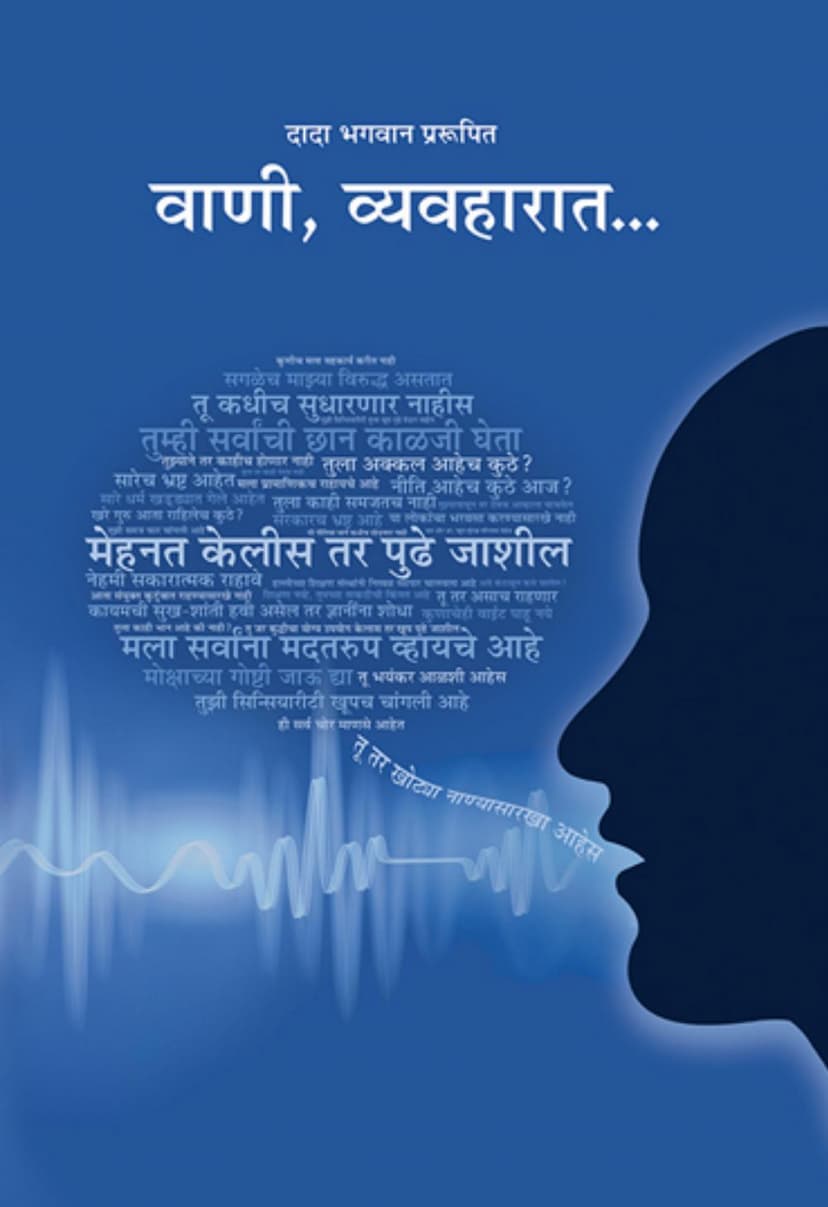Spirituality In Speech Marathi
Added to library: September 2, 2025

Summary
Here's a comprehensive summary of the Jain text "Spirituality in Speech Marathi" by Dada Bhagwan, based on the provided pages:
Book Title: Spirituality in Speech Marathi (वाग्वा, व्यवहारात...) Author: Dada Bhagwan Publisher: Dada Bhagwan Aradhana Trust
This book, translated from Gujarati, focuses on the profound spiritual and practical aspects of speech (Vani) according to the teachings of Dada Bhagwan. It delves into how our words shape our reality, our relationships, and our spiritual progress.
Core Philosophy:
The central theme of the book is that speech is a powerful force that creates our reality. Dada Bhagwan emphasizes that our words are not mere sounds but are actual manifestations of our inner state and have tangible consequences. He advocates for a conscious and responsible use of speech, highlighting its ability to create harmony or conflict, peace or suffering.
Key Concepts and Teachings:
- Speech as a Recorder: Dada Bhagwan explains that our speech acts like a "tape recorder," capturing impressions and creating subsequent realities. This implies that whatever we say, good or bad, is recorded within and influences future experiences.
- The Power of Words: The book stresses that words have the power to heal or wound, to build relationships or destroy them. Harsh or critical words are described as "poison" that create suffering, while sweet and compassionate words are like "nectar."
- The Nature of Conflict: A significant portion of the book is dedicated to understanding how speech leads to conflict. The text explains that misunderstandings, harsh language, and the desire to be right are primary drivers of disputes.
- The "Akram" (Non-Sequential) Path: Dada Bhagwan's teachings are based on the Akram path, which offers a direct and rapid way to achieve self-realization. This path emphasizes understanding the underlying principles of karma and consciousness that govern our speech and actions.
- The Importance of "Pratikraman" (Self-Correction): When speech leads to negative consequences or internal conflict, the practice of "pratikraman" is crucial. This involves acknowledging one's mistake, seeking forgiveness (from oneself and potentially others), and resolving not to repeat the error.
- Understanding the "Organizer": The book introduces the concept of the "organizer" within, who is responsible for our speech and actions. Understanding this inner organizer helps in taking responsibility for our words.
- Speech and Karma: The text links speech directly to karma. Every word spoken creates new karmic impressions that will ripen in the future. Therefore, maintaining pure and positive speech is essential for a favorable karmic future.
- The "Chandu Bhai" Analogy: Throughout the book, interactions with "Chandu Bhai" (a representative name for the reader) illustrate practical scenarios of speech. The reader is encouraged to see themselves in Chandu Bhai's experiences and apply the teachings.
- The Science of Speech: Dada Bhagwan presents a scientific approach to understanding speech, explaining how words create vibrations, influence the mind, and impact the body.
- Conscious Speech vs. Mechanical Speech: The book differentiates between speaking consciously with awareness and speaking mechanically based on ingrained habits. The latter often leads to unintended negative consequences.
- The "Well-Ordered" Power: The concept of "Vyavasthit Shakti" (well-ordered power) is presented, suggesting that everything that happens, including our speech, is governed by a universal order. Understanding this helps in surrendering to the flow rather than resisting it.
- The Ideal Speech: The ideal speech is described as:
- Truthful (Satya): But not just factual truth, but truth that is also pleasant and beneficial.
- Pleasant (Priya): Words that are agreeable and do not cause offense.
- Beneficial (Hitkari): Words that contribute to the well-being of oneself and others.
- Measured (Mit): Speaking in appropriate proportion and at the right time.
- Syadvada: Speaking in a way that acknowledges multiple perspectives, avoiding absolute pronouncements.
- The Role of the Gnani (Self-Realized Being): The book highlights that true understanding and transformation in speech can only come from a Gnani, who has already transcended the limitations of ego and speech. They offer direct guidance and, through their grace, can help others achieve similar clarity.
- Specific Advice on Different Situations: The book offers practical guidance for various interpersonal relationships, including:
- Husband-Wife: Addressing arguments, understanding each other's perspectives, and communicating with love and respect.
- Parent-Child: Navigating generational differences, understanding children's behavior, and communicating constructively.
- Business Dealings: Maintaining integrity and using appropriate language.
- General Interactions: Avoiding gossip, criticism, and judgmental speech.
Key Takeaways for the Reader:
- Take Responsibility for Your Words: Recognize that your speech directly influences your experiences.
- Cultivate Mindfulness in Speech: Be aware of what you say and its potential impact.
- Practice Compassion and Empathy: Speak to others as you would like to be spoken to.
- Embrace "Pratikraman": Correct yourself when you err in speech.
- Seek the Guidance of a Gnani: True mastery of speech comes through spiritual wisdom and grace.
- Understand that "Speech is a Record": Be mindful of the "recordings" you are creating for your future.
In essence, "Spirituality in Speech Marathi" serves as a practical guide to mastering one's speech, transforming it from a source of suffering into a tool for spiritual growth, harmony, and ultimately, liberation. It encourages a profound shift in how we perceive and use our words, leading to a more peaceful and fulfilling life.